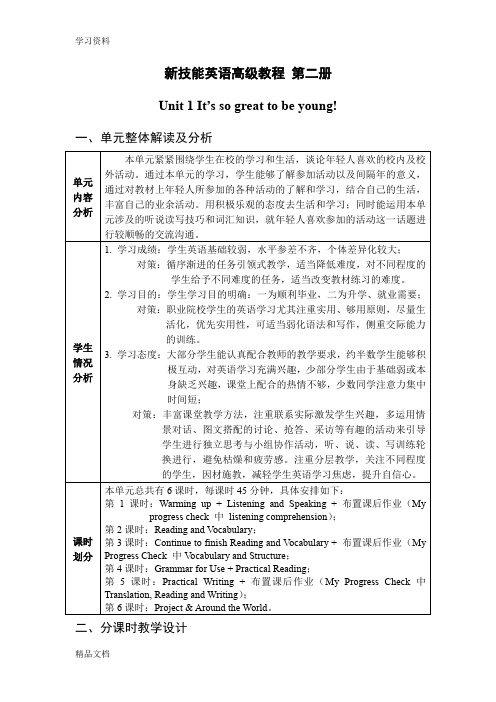新技能英语(1)第一单元教案
新技能英语-高级教程教案-unit1

一、单元整体解读及分析1. Background informationE-Commerce: The beginnings of e-commerce can be traced back to the 1960s, when businesses started using Electronic Data Interchange (EDI) to share business documents with other companies. In 1979, the American National Standards Institute developed ASC X12 as a universal standard for businesses to share documents through electronic networks. After the number of individual users sharing electronic documents with each other grew in the 1980s, in the 1990s the rise of eBay and Amazon revolutionized the e-commerce industry. Consumers can now purchase endless amounts of items online, both from typical brick and mortar stores with e-commerce capabilities and one another.2. Word attack1) registration n. the act of entering on an official list. 注册e.g. Kindergarten registration begins today.2) major n. the main subject studied by a college or university student. 主修科目e.g. He chose history as his major and French as his minor majors.What was your major in college?3) fill in supply with information on a specific topic. 填写e.g. The participants were then asked to fill in evaluation forms giving their assessment of the workshop.4) admission notice 录取通知书e.g. With your college admission notice, you can buy train tickets at half-price.3. Useful expressionsAsk for and Offer Help1) What can I do for you?2) May I have your…please?3) I’m here for…4) Excuse me, but could you tell me the steps for registration?5) Is there anything I can do for you?6) Would you mind passing me a piece of paper to write my suggestion on?7) Will you lend me a hand?4. Extensive reading materialsCollege majors:/5. Useful clipsGuide for freshmen1. Background informationCan I change my major?Yes. In fact, studies find that most students change majors at least once and many switch several times. So it might not be a good idea to pick a college only for its program in one major. Instead, consider colleges that offer a range of options that interest you. That way, changing majors won't necessarily require changing colleges, too.If I want to become a doctor or lawyer, do I have to major in premed or prelaw? It might surprise you to know that majoring in premed or prelaw is impossible at almost every college. Premed and prelaw, are not majors. They are special college programs that guide students through the process of preparing for and applying to professional schools, such as medical or law school.So, if you choose to participate in one of these programs, you'll still have to declare a major. Many premed students, for example, major in biology or chemistry. However, as long as you fulfill the admission requirements of the professional school, you can major in just about anything. In fact, professional schools often look for well-rounded students with diverse backgrounds.See the full list at2. Word attack (教师可补充词语的其他常用意思,辅以例句。
unit 1 新技能英语教学设计教学文案

新技能英语高级教程第二册Unit 1 It’s so great to be young!一、单元整体解读及分析二、分课时教学设计第1课时第2课时第3课时第4课时第5课时第6课时Reading and Vocabulary译文:波莉是一名来自美国的十八岁的女孩,高中毕业后她有一年的间隔年。
她作为志愿者曾经在南非的野生动物保护中心工作过一年。
她回忆到:这个间隔年的经历很精彩,它让我发现了我以前未知的潜力。
这个经历让我永生难忘!间隔年是指高中毕业到上大学之间所间隔的一年。
很多年轻人利用这一年的时间去旅行,赚钱或是获得更多的工作方面的经验。
不同人对学术间断年的态度不一。
让我们来看看一些学生是如何来谈论它的。
莉萨:我很想拥有这样一个间隔年。
我相信间隔年可以帮助我找到我真的想在未来做的事情。
我热爱旅游,所以,在这空闲的一年,我会环球旅行,和不同的文化进行接触。
一年的时间足够让我去任何地方并认识整个世界。
在这一年里,我也可以做一些兼职,挣些钱去支付我旅行的费用。
安迪:好多人在高中时不知道自己想要做什么。
用间隔年这段时间去弄清楚自己未来的方向是很明智的做法。
你可以在你的简历中写上自己的现实价值,并通过在一些特定领域的工作来拓展自己珍贵的第一手的行业知识。
王晓明:如果有机会的话我想拥有一个间隔年。
我可以找一份兼职工作或当一名志愿者去挖掘我的能力。
此外,间隔年可以帮助我更好地为大学和社会做好准备。
然而,间隔年也让我有一点担心,因为,学生在这么小的年纪就独自出去工作或旅行很可能遇到危险。
此外,一些学生发现,旅行或工作一年后他们很难再次适应学术氛围。
Around the World译文:霹雳舞是街舞的一种,它是风格、肢体协调与美的结合。
霹雳舞在美国的早期发展阶段起源于嘻哈音乐。
霹雳舞最流行的动作之一就是舞者用一只手支撑自己的身体,在地上旋转并伴随复杂的踢腿动作。
跑酷来源于法语词parcours,意思是路线或道路。
跑酷的目的是跳跃攀爬任何障碍物如围墙、台阶或栅栏等。
英语(基础模块)第一册第01-unit1教案

第8课时:练习课。听写、评价作业。巩固提高学生的学习内容,达到复习巩固、评价反馈、拓展延伸的作用,同时帮助学生将所学知识和技能系统梳理,提升学习效果,并增强学生自信心。
二、分课时教学设计
第1-2课时
教学
目标
语言知识目标:1.熟练常见国家名称,如China, UKБайду номын сангаас USA, Australia,
Egypt,France, etc.;以及由此延伸出的常见国籍的表达
或Are you from…或Is it a beautiful place询问该同学;或者用Where is she / he from 或Is he / she from…问其他同学。通过几轮练习,激活学生掌握几句基本句型。
3.请同学们看首页大图,介绍本单元课题。让学生通过标题NicePeople, Nice Places猜测本课学习内容及词汇。
利用图示理论,减少二语学习中母语的干扰。
由机械性操练过渡到半开放性操练,学生有更多思考的机会。
7’
练习
游戏——哪里人:教师请学生每人在卡片上写一个国家名和姓名并收集起来,例如:America, Britain等。由提问的学生抽卡片向全班出示,并用Where are you from提问;被抽到的同学按照提示回答:I’m from America. I’m American.提问同学又问:How do you find it?
unit 1 新技能英语教学设计教案资料

新技能英语高级教程第二册Unit 1 It’s so great to be young!一、单元整体解读及分析二、分课时教学设计第1课时第2课时第3课时第4课时第5课时第6课时Reading and Vocabulary译文:波莉是一名来自美国的十八岁的女孩,高中毕业后她有一年的间隔年。
她作为志愿者曾经在南非的野生动物保护中心工作过一年。
她回忆到:这个间隔年的经历很精彩,它让我发现了我以前未知的潜力。
这个经历让我永生难忘!间隔年是指高中毕业到上大学之间所间隔的一年。
很多年轻人利用这一年的时间去旅行,赚钱或是获得更多的工作方面的经验。
不同人对学术间断年的态度不一。
让我们来看看一些学生是如何来谈论它的。
莉萨:我很想拥有这样一个间隔年。
我相信间隔年可以帮助我找到我真的想在未来做的事情。
我热爱旅游,所以,在这空闲的一年,我会环球旅行,和不同的文化进行接触。
一年的时间足够让我去任何地方并认识整个世界。
在这一年里,我也可以做一些兼职,挣些钱去支付我旅行的费用。
安迪:好多人在高中时不知道自己想要做什么。
用间隔年这段时间去弄清楚自己未来的方向是很明智的做法。
你可以在你的简历中写上自己的现实价值,并通过在一些特定领域的工作来拓展自己珍贵的第一手的行业知识。
王晓明:如果有机会的话我想拥有一个间隔年。
我可以找一份兼职工作或当一名志愿者去挖掘我的能力。
此外,间隔年可以帮助我更好地为大学和社会做好准备。
然而,间隔年也让我有一点担心,因为,学生在这么小的年纪就独自出去工作或旅行很可能遇到危险。
此外,一些学生发现,旅行或工作一年后他们很难再次适应学术氛围。
Around the World译文:霹雳舞是街舞的一种,它是风格、肢体协调与美的结合。
霹雳舞在美国的早期发展阶段起源于嘻哈音乐。
霹雳舞最流行的动作之一就是舞者用一只手支撑自己的身体,在地上旋转并伴随复杂的踢腿动作。
跑酷来源于法语词parcours,意思是路线或道路。
跑酷的目的是跳跃攀爬任何障碍物如围墙、台阶或栅栏等。
人教版高中英语Unit1-Friendship-优秀教案

教案人教版高一英语《英语1》第一单元Friendship第1课时:Warming up and Pre-reading一.教学目的①学问目的:⑴让学生驾驭以下生词与短语: survey add point upset ignore calm concern loose cheat add up calm down have got to be concerned about walk the dog⑵让学生学会运用以下构造来表达看法,同意与不同意与确定语气: Are you afraid that. . . ? I (don’t)think. . . In my opinion, . . . I (don’t)think so, I (don’t)agree, I believe. . . , I’m afraid not, Exactly, That’s correct, Of course not.②技能目的:1.让学生学会用英语描绘自己的挚友。
2.列出挚友间通常存在的问题,并找的不同方法来解决这些问题。
3.激励学生用本课学到的一些短语与构造来思索与议论挚友与友情。
③情感目的1.让学生学会如何解决挚友间可能出现的问题。
2.培育学生在高中阶段形成学习英语的好习惯。
二.教学重点1.用给定的形容词与句子构造来描绘他们的一个挚友。
2.学习评价挚友与友情。
三.教学难点1.与伙伴合作并描绘他们的一个好挚友。
2.与伙伴探讨并找出解决问题的方法。
四.教学方法1.任务型教学法2.合作学习法3.探讨法五.教学打算多媒体与其他常规教学工具六.教学过程1.导入新课:第一步:导入Lead-in上课前,老师可以通过展示一个友情天长地久的视频来激发学生的学习爱好,。
这是新学期的第一节课。
所以在一开场,请学生用他们喜爱的方式来谈谈关于新学校与挚友的话题。
1. How did you spend your summer holidays? How did you feel? What did you do in your summer holidays? What did you do in your spare time?2. What do you think of our new school? Do you like it? Could you say something about it?3. Do you like making friends? How do you get in touch with your friends? Do you have many friends? Where are they now? Do you have any old friends in our school? Have you made any new friends in our class?(其他关于本单元的话题导入的建议:1。
新技能英语基础教程1教学课件Unit 1(思政版)

Listening and Speaking
4 Listen and practice. 听录音,谈论学校课程。
Sophie: What subjects are you taking this term, Li Wei? Li Wei: We all take maths, English and computer basics. Sophie: Do all of you take the same skill-training classes? Li Wei: No. Some of us learn cookery, some learn
in the afternoon
where
in the classroom
in different places
what to do study English and maths do skills training
Reading and Writing
3 Read and learn. 读以下三个专业的介绍。
Reading and Writing
3 Read and learn. 读以下三个专业的介绍。
Major: Travel and Tourism Main subjects: Chinese, English, Customer Service Future job: tour guide
专业:旅游 主要课程:语文,英语,客户服务 未来职业:导游
Major: Secretarial Skills Main subjects: Chinese, Computer Basics,
Business Communication Future job: secretary in a company
新技能英语-高级教程教案-unit1
一、单元整体解读及分析1. Background informationE-Commerce: The beginnings of e-commerce can be traced back to the 1960s, when businesses started using Electronic Data Interchange (EDI) to share business documents with other companies. In 1979, the American National Standards Institute developed ASC X12 as a universal standard for businesses to share documents through electronic networks. After the number of individual users sharing electronic documents with each other grew in the 1980s, in the 1990s the rise of eBay and Amazon revolutionized the e-commerce industry. Consumers can now purchase endless amounts of items online, both from typical brick and mortar stores with e-commerce capabilities and one another.2. Word attack1) registration n. the act of entering on an official list. 注册e.g. Kindergarten registration begins today.2) major n. the main subject studied by a college or university student. 主修科目e.g. He chose history as his major and French as his minor majors.What was your major in college?3) fill in supply with information on a specific topic. 填写e.g. The participants were then asked to fill in evaluation forms giving their assessment of the workshop.4) admission notice 录取通知书e.g. With your college admission notice, you can buy train tickets at half-price.3. Useful expressionsAsk for and Offer Help1) What can I do for you?2) May I have your…please?3) I’m here for…4) Excuse me, but could you tell me the steps for registration?5) Is there anything I can do for you?6) Would you mind passing me a piece of paper to write my suggestion on?7) Will you lend me a hand?4. Extensive reading materialsCollege majors:/5. Useful clipsGuide for freshmen1. Background informationCan I change my major?Yes. In fact, studies find that most students change majors at least once and many switch several times. So it might not be a good idea to pick a college only for its program in one major. Instead, consider colleges that offer a range of options that interest you. That way, changing majors won't necessarily require changing colleges, too.If I want to become a doctor or lawyer, do I have to major in premed or prelaw? It might surprise you to know that majoring in premed or prelaw is impossible at almost every college. Premed and prelaw, are not majors. They are special college programs that guide students through the process of preparing for and applying to professional schools, such as medical or law school.So, if you choose to participate in one of these programs, you'll still have to declare a major. Many premed students, for example, major in biology or chemistry. However, as long as you fulfill the admission requirements of the professional school, you can major in just about anything. In fact, professional schools often look for well-rounded students with diverse backgrounds.See the full list at2. Word attack (教师可补充词语的其他常用意思,辅以例句。
新技能英语 基础教程2 电子教案(适用4课时)unit1-3
Make a summary of the unit and helpthe studentstodo a revision.
Make introductions
Greet and say goodbye to others
1. Askthe students to read the words, phrases and sentences in class.
□In the US, people usually kiss others’ cheeks to say hello.
□“Sawatdee” means goodbye in Thailand.
□In New Zealand, people usually press their noses and foreheads together as away of greeting.
教学
难点
Learn to value other countries’cultures.
Helpthe students improve their abilities to conclude and revise.
教具
Name cardsMultimedia courseware
教
学
环
节
设
计
教
学
环
Name
Title
Company Name
Addrestudents to read the name cards on Page 8 and pay attention to the writing rules.
IV. Letthe students do Activity②.Ask them to introduce the people according to the name cards.
新技能英语 基础教程1 电子教案(适用于周3课时)电子教案第一册U10-1
3. To be able to talk about people’s activities during these festivals.
教学 重点
The script & video clips of dialogues. 教具 PowerPoint presentation slides of images about different Chinese and
foreign festivals.
教 学 环 节 教学步骤 教学过程设计 设 计
n
these festivents to introduce these festival
activities individually.
教学 环节 设计
Summary
Key words:
lantern festival hang similar Halloween
教学 难点
The functional sentences often used to describe people’s activities during Chinese and foreign festivals.
Which festival does the picture show? What do people do during this festival?
I. Present pictures about Lantern Festival, Halloween
and Christmas, and ask the students to ask some
新模式英语1教案-(版)
新模式英语1教案一、教学目标1.知识与技能:(1)学生能够听懂、会说、会读、会写本节课的重点单词和短语,如:“Hello,mynameis”,“I’mfrom”,“Nicetomeetyou.”等。
(2)学生能够运用本节课所学的重点句型进行自我介绍和询问他人的基本信息。
(3)学生能够理解并运用一般现在时态描述自己的基本情况。
2.过程与方法:(1)通过听、说、读、写的训练,提高学生的英语综合运用能力。
(2)通过小组合作,培养学生的团队协作能力和交流沟通能力。
(3)通过任务型教学,激发学生的学习兴趣,提高学生的自主学习能力。
3.情感态度与价值观:(1)培养学生对英语学习的兴趣和自信心。
(2)培养学生尊重他人、友好交往的良好品质。
(3)培养学生的跨文化交际意识。
二、教学内容1.教学重点:(1)单词:Hello,mynameis,I’mfrom,Nicetomeetyou.(2)短语:Howoldareyou?,Whatdoyoudo?,Whereareyoufrom?(3)句型:A:Hello,mynameisB:Hi,mynameisA:I’mfromB:I’mfrom2.教学难点:(1)一般现在时态的运用。
(2)自我介绍和询问他人基本信息的表达。
三、教学过程1.导入(5分钟)(1)教师与学生用英语进行简单的问候,营造英语学习氛围。
(2)教师引导学生复习已学的英语知识,为新课的学习做好铺垫。
2.呈现(10分钟)(1)教师展示本节课的重点单词和短语,引导学生跟读、模仿。
(2)教师通过图片、实物等教具,帮助学生理解和记忆单词和短语。
3.练习(10分钟)(1)教师组织学生进行角色扮演,练习自我介绍和询问他人基本信息。
(2)教师引导学生运用一般现在时态描述自己的基本情况。
4.互动(10分钟)(1)学生分组进行对话练习,巩固所学知识。
(2)教师巡回指导,纠正学生的发音和语法错误。
5.产出(10分钟)(1)学生独立完成一篇关于自我介绍的英语作文。
- 1、下载文档前请自行甄别文档内容的完整性,平台不提供额外的编辑、内容补充、找答案等附加服务。
- 2、"仅部分预览"的文档,不可在线预览部分如存在完整性等问题,可反馈申请退款(可完整预览的文档不适用该条件!)。
- 3、如文档侵犯您的权益,请联系客服反馈,我们会尽快为您处理(人工客服工作时间:9:00-18:30)。
教具 The scripts & video clips of dialogues. PowerPoint presentation slides of different vocational schools.
Where are they? What are they doing? II. Introduce the learning content to the students: They are going to read an e-mail about Li Wei’s school life.
教学 环节 设计
单元 Unit 1 School becomes interesting. B
学习 目标
1. To be able to read and understand the meaning of a passage with reading strategies: scanning, skimming and guessing the meaning of unfamiliar words from the context. 2. To be able to analyse and compare information. 3. To be able to understand the meanings of different majors and notices about varied students’ clubs.
V. Ask the students to listen to the dialogue again. And then ask them to form groups and practice it in turns. Ask them to make or act new dialogues with the given words and pictures in Activity ③.
Teaching Plan
单元 Unit 1 School becomes interesting. A
学习 目标
1. To be able to know the vocabularies and basic sentence patterns about school life. 2. To be able to understand the dialogues about describing school life and subjects. 3. To be able to talk about school life. 4. To be able to describe family members and friends.
II. Play the tape and ask the students to listen and try to answer the questions.
III. Play the tape again and then ask students to listen and fill in the blanks. Show students the dialogue with blanks, ask them to fill in the words like “subjects, take, skill-training, accounting, others, useful”. Then check answers.
IV. Explain the meaning of the dialogue and the difficult sentences in it.
V. Ask the students to listen to the dialogue in Activity ④ again and try to act the dialogue with their partners.
1
Warming up
I. Show students the picture on Page 5 of Unit 1. Ask them to look at the picture and discuss: 1. Where are they? 2. What are they doing?
II. Introduce the names of the places to students. III. Ask the students to listen to five sentences and
教学 1. To be able to know some words about school life and subjects. 重点 2. To be able to talk about some things happening in school.
The functional sentences about how to ask about school lives and 教学 subjects. 难点 What do you usually do there?
I. Ask the students to skim the e-mail on Page 9, and try to answer the above questions. Give the students some advice about reading skills.
II. Play the tape. Ask the students to read after the tape and underline the important phrases. Explain the meanings of the difficult phrases to students. Encourage them to make sentences with these phrases.
2
教学 环节 设计
Listening & Speaking practice (2)
I. Ask the students to look at the picture on Page 8, and then listen to the dialogue of Activity ④. Ask students to look at the following questions before they listen to the dialogue: How many subjects does Li Wei have this term? What are the subjects? Do the students learn accounting?
and others learn car-repair.
Homework
1. Ask the students to read the dialogue. 2. Ask the students to memorise the vocabulary and sentences. 3. Ask the students to talk about their school life.
II. Show the picture in Activity ②. Tell students they are going to listen to a short dialogue about school life. Give them some advice on listening skills.
III. Play the tape twice and ask the students to read it after the tape.
IV. Present the basic sentences on the blackboard: We have our… classes in… What do you usually do there? We learn how to…
II. Ask the students to talk about what subjects they are learning in their school.
3
Key vocabulary: computer lab car-repair skill-training machine interesting subject cookery accounting
Pre-reading
Reading practice (1)
I. Present some new words on the slide. Tell students their meanings and pronunciations.
II. Present the following questions to students: Where is Li Wei studying now? Where do Li Wei and his classmates work? Do they have classes in factories?
match the key words in the sentences with the pictures in Activity ①, Warming up. Present the key sentences on the slide and explain their meanings. IV. Ask students to look at the six pictures in Activity ②, and then tick out the courses they have ever taken.
4
PowerPoint presentation slides of es of different people, key 教具 words and tips for reading.
